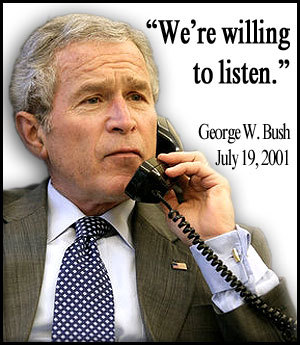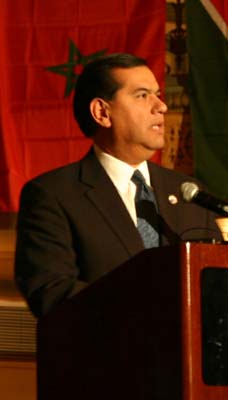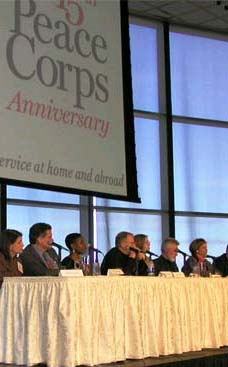2006.05.15: May 15, 2006: Headlines: Presidents - Bush: Speaking Out: Fourth Amendment: Boston Globe: Bush stomps on Fourth Amendment
Peace Corps Online:
Peace Corps News:
Peace Corps Library:
Investigative Journalism:
January 23, 2005: Index: PCOL Exclusive: Investigative Journalism :
2006.05.15: May 15, 2006: Headlines: Journalism: Intelligence Issues: Investigative Journalism: Presidents - Bush: First Amendment: ABC News: A senior federal law enforcement official tells ABC News the government is tracking the phone numbers reporters call in an effort to root out confidential sources :
2006.05.15: May 15, 2006: Headlines: Presidents - Bush: Speaking Out: Fourth Amendment: Boston Globe: Bush stomps on Fourth Amendment
Bush stomps on Fourth Amendment

Even if one trusts the president's promise not to connect all the dots to the degree the technology permits, the act of collecting all those dots in a form that permits their complete connection at his whim is a ''search." And doing it to all Americans, not just those chatting with Al Qaeda, and with no publicly reviewable safeguards to prevent abuse, is an ''unreasonable search" if those Fourth Amendment words have any meaning at all.
Bush stomps on Fourth Amendment
Bush stomps on Fourth Amendment
By Laurence H. Tribe | May 16, 2006
THE ESCALATING controversy over the National Security Agency's data mining program illustrates yet again how the Bush administration's intrusions on personal privacy based on a post-9/11 mantra of ''national security" directly threaten one of the enduring sources of that security: the Fourth Amendment ''right of the people to be secure in their persons, houses, papers, and effects, against unreasonable searches and seizures."
The Supreme Court held in 1967 that electronic eavesdropping is a ''search" within the meaning of the Fourth Amendment, recognizing that our system of free expression precludes treating each use of a telephone as an invitation to Big Brother to listen in. By 2001, the court had come to see how new technology could arm the government with information previously obtainable only through old-fashioned spying and could thereby convert mere observation -- for example, the heat patterns on a house's exterior walls -- to a ''search" requiring a warrant. To read the Constitution otherwise, the court reasoned, would leave us ''at the mercy of advancing technology" and erode the ''privacy against government that existed when the Fourth Amendment was adopted." This decision, emphasizing the privacy existing when the Bill of Rights was originally ratified in 1791, was no liberal holdover in conservative times. Its author was Justice Antonin Scalia. Justice Clarence Thomas joined the majority. Justice John Paul Stevens wrote the dissent. This issue should not divide liberals from conservatives, Democrats from Republicans.
These two decisions greatly undermine the aberrant 1979 ruling on which defenders of the NSA program rely, in which a bare Supreme Court majority said it doubted that people have any ''expectation of privacy in the numbers they dial," since they ''must 'convey' [such] numbers to the telephone company," which in turn can share them with others for purposes like ''detecting fraud and preventing violations of law." Unconvincing then, those words surely ring hollow today, now that information technology has made feasible the NSA program whose cover was blown last week. That program profiles virtually every American's phone conversations, giving government instant access to detailed knowledge of the numbers, and thus indirectly the identities, of whomever we phone; when and for how long; and what other calls the person phoned has made or received. As Justice Stewart recognized in 1979, a list of all numbers called ''easily could reveal . . . the most intimate details of a person's life."
The Fourth Amendment's guarantee against unconstrained snooping by Big Brother -- made bigger by an onrush of information-trolling technology that few foresaw in 1979 -- is bipartisan. It is a guarantee that cannot tolerate the pretense that numbers called from a private phone, unlike the conversations themselves, are without ''content." That pretense is impossible to maintain now that the technology deployed by NSA enables the agency to build a web with those numbers that can ensnare individuals -- all individuals -- just as comprehensively and intimately as all-out eavesdropping.
Even if one trusts the president's promise not to connect all the dots to the degree the technology permits, the act of collecting all those dots in a form that permits their complete connection at his whim is a ''search." And doing it to all Americans, not just those chatting with Al Qaeda, and with no publicly reviewable safeguards to prevent abuse, is an ''unreasonable search" if those Fourth Amendment words have any meaning at all.
The legal landscape, too, has changed decisively since the court's majority opined that Americans have no expectation of privacy in the numbers they call. Rejecting the accuracy of that description even decades ago, Congress, which was more vigorous then in its protection of privacy, enacted statutes reassuring us that our phone records would not be shared willy-nilly with government inquisitors without court orders. So it can no longer be said, if it ever could have been, that our ''expectations of privacy" about whom we call are groundless or that we ''consent" to reconstruction of our telephone profiles by using one of the phone companies that, unbeknownst to us, have agreed to share such information (although, we're told, not the content of every call) with NSA on demand.
Privacy apart, this president's defiance of statutes by the dozens is constitutionally alarming. But the matter goes deeper still. Even if Congress were to repeal the laws securing telephone privacy, or if phone companies found loopholes to slip through when pressured by government, the Constitution's Fourth Amendment shield for ''the right of the people to be secure" from ''unreasonable searches" is a shield for all seasons, one that a lawless president, a spineless Congress, and a complacent majority of citizens -- who are conditioned to a government operating under a shroud of secrecy while individuals live out their lives in fishbowls -- cannot be permitted to destroy, for the rest of us and our children.
Laurence H. Tribe is a professor of constitutional law at Harvard Law School and the Carl M. Loeb University Professor.
© Copyright 2006 Globe Newspaper Company.
When this story was posted in May 2006, this was on the front page of PCOL:





Peace Corps Online The Independent News Forum serving Returned Peace Corps Volunteers
 | It's Official: Vasquez nominated to FAO
Exactly one week ago we predicted that Director Vasquez would soon be receiving a major ambassadorship. Today the White House confirmed that Vasquez will be the new Representative to the United Nations Agencies for Food and Agriculture replacing Tony Hall.
PCOL Comment: Director Vasquez, let us be the first to thank you for your service to the Peace Corps, congratulate you on your new appointment, and wish you good luck in your future endeavors. Although we have had our differences over the years and we opposed your nomination in 2001, we think you are leaving a solid legacy of accomplishment and have served the Peace Corps well.
Initiatives and Accomplishments: Vasquez's major initiatives and accomplishments since becoming Peace Corps Director include: an agreement with Mexico in 2003 to host volunteers, sending RPCVs to work domestically in Hurricane relief after Katrina, emphasis on recruitment of minorities and of community college graduates, upgrading Peace Corps' infrastructure especially IT upgrades in the online application tracking process and the Volunteer Delivery System, an emphasis on safety and security of volunteers including the creation of a Situation Room at Peace Corps Headquarters, modifying Peace Corps' "Five Year Rule" for employment, and the expansion of the Peace Corps to its highest level in 30 years. He is the third longest serving Peace Corps Director after Loret Ruppe Miller and Sargent Shriver. |
 | The Peace Corps Library
The Peace Corps Library is now available online with over 40,000 index entries in 500 categories. Looking for a Returned Volunteer? Check our RPCV Directory. New: Sign up to receive PCOL Magazine, our free Monthly Magazine by email. Like to keep up with Peace Corps news as it happens? Sign up to recieve a daily summary of Peace Corps stories from around the world. |
 | Interview with a Hit Man
RPCV John Perkins says that for many years he was an "economic hit man" in the world of international finance whose primary job was to convince less developed countries to accept multibillion dollar loans for infrastructure projects that left the recipient countries wallowing in debt and highly vulnerable to outside political and commercial interests. In this exclusive interview for "Peace Corps Online," Colombia RPCV Joanne Roll, author of Remember with Honor, talks to Perkins about his Peace Corps service, his relation with the NSA, "colonization" in Ecuador, the consequences of his work, why he decided to speak out, and what his hopes are for change. |
 | Peace Corps stonewalls on FOIA request
The Ashland Daily Tidings reports that Peace Corps has blocked their request for information on the Volkart case. "After the Tidings requested information pertaining to why Volkart was denied the position — on March 2 — the newspaper received a letter from the Peace Corps FOIA officer stating the requested information was protected under an exemption of the act." The Dayton Daily News had similar problems with FOIA requests for their award winning series on Volunteer Safety and Security. |
 | PCOL readership increases 100%
Monthly readership on "Peace Corps Online" has increased in the past twelve months to 350,000 visitors - over eleven thousand every day - a 100% increase since this time last year. Thanks again, RPCVs and Friends of the Peace Corps, for making PCOL your source of information for the Peace Corps community. And thanks for supporting the Peace Corps Library and History of the Peace Corps. Stay tuned, the best is yet to come. |
 | History of the Peace Corps
PCOL is proud to announce that Phase One of the "History of the Peace Corps" is now available online. This installment includes over 5,000 pages of primary source documents from the archives of the Peace Corps including every issue of "Peace Corps News," "Peace Corps Times," "Peace Corps Volunteer," "Action Update," and every annual report of the Peace Corps to Congress since 1961. "Ask Not" is an ongoing project. Read how you can help. |
 | PC announces new program in Cambodia
Director Vasquez and Cambodia's Deputy Chief of Mission Meng Eang Nay announced a historic new partnership between the Peace Corps and the Kingdom of Cambodia that will bring volunteers to this Southeast Asian country for the first time. Under King Norodom Sihamoni and Prime Minister Hun Sen, Cambodia has welcomed new partnerships with the U.S. government and other U.S. organizations. |
 | Peace Corps suspends program in Bangladesh
Peace Corps Director Gaddi H. Vasquez announced the suspension of the Peace Corps program in Bangladesh on March 15. The safety and security of volunteers is the number one priority of the Peace Corps. Therefore, all Peace Corps volunteers serving in Bangladesh have safely left the country. More than 280 Peace Corps volunteers have served in Bangladesh since the program opened in November 1998. Latest: What other newspapers say. |
 | Invitee re-assigned after inflammatory remarks
The Peace Corps has pulled the invitation to Derek Volkart to join the Morocco Training Program and offered him a position in the Pacific instead after officials read an article in which he stated that his decision to join the Peace Corps was in "response to our current fascist government." RPCV Lew Nash says that "If Derek Volkart spoke his mind as freely in Morocco about the Moroccan monarchy it could cause major problems for himself and other Peace Corps volunteers." Latest: Volkart reverses stance, takes new assignment in Paraguay. |
 | RPCV admits to abuse while in Peace Corps
Timothy Ronald Obert has pleaded guilty to sexually abusing a minor in Costa Rica while serving there as a Peace Corps volunteer. "The Peace Corps has a zero tolerance policy for misconduct that violates the law or standards of conduct established by the Peace Corps," said Peace Corps Director Gaddi H. Vasquez. Could inadequate screening have been partly to blame? Mr. Obert's resume, which he had submitted to the Peace Corps in support of his application to become a Peace Corps Volunteer, showed that he had repeatedly sought and obtained positions working with underprivileged children. Read what RPCVs have to say about this case. |
 | Why blurring the lines puts PCVs in danger
When the National Call to Service legislation was amended to include Peace Corps in December of 2002, this country had not yet invaded Iraq and was not in prolonged military engagement in the Middle East, as it is now. Read the story of how one volunteer spent three years in captivity from 1976 to 1980 as the hostage of a insurrection group in Colombia in Joanne Marie Roll's op-ed on why this legislation may put soldier/PCVs in the same kind of danger. Latest: Read the ongoing dialog on the subject. |
Read the stories and leave your comments.

Some postings on Peace Corps Online are provided to the individual members of this group without permission of the copyright owner for the non-profit purposes of criticism, comment, education, scholarship, and research under the "Fair Use" provisions of U.S. Government copyright laws and they may not be distributed further without permission of the copyright owner. Peace Corps Online does not vouch for the accuracy of the content of the postings, which is the sole responsibility of the copyright holder.
Story Source: Boston Globe
This story has been posted in the following forums: : Headlines; Presidents - Bush; Speaking Out; Fourth Amendment
PCOL32780
39




















